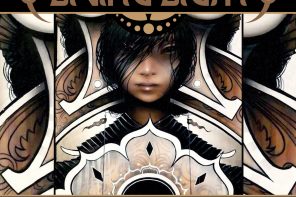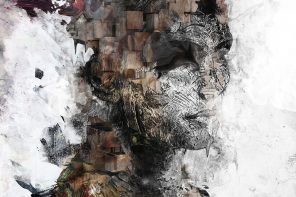[LiS] Tell us a bit about your Symbiosis experience.
[Max Cooper] The whole thing is based around this eclipse. I had never played a gig in the desert before and I didn’t know anything about it. I got on the plane thinking I was going to play a club gig or some sort of normal festival, so I was totally unprepared. I arrived and we just got into a car and started driving off into the desert, and I was like “how come we’re driving into the desert, there doesn’t seem to be many cities out here.” And then we just sort of arrived at this place in the middle of nowhere, and it was all dusty and hot and crazy but that just added to the fun.
For the first while, I was getting annoyed because I couldn’t clean myself and all of my normal comforts were gone, but that’s what you need at festivals – it snaps out of your everyday crap… the stuff you get concerned with, whether you can shower or clean your hands or something. That stuff is important in general. You don’t want to get really smelly, but it is easy to spend too much of your time thinking about these things that aren’t really important. It’s good to go somewhere that snaps you out of your normal routines, and then you’re in this completely different sort of world, which it was. I met some really nice people, and was there for two or three days. It was pretty crazy. I think it was pretty much all Funktion 1’s. The sound there was excellent, and there was a lot of care and love put into everything.
Where is your favorite place to play?
My favorite place to play are the major international cities in the world – New York, San Fran, Amsterdam, London, Berlin. Those sort of major cities that draw people from all over the world where you get that sort of mixing of cultures and ideas. Those places generally are where people are most open minded to new things, places where you can really experiment a lot and do something odd.
Name some of your major sound design influences.
John Hopkins, he’s one of the best. Lusine, he’s a great sound designer. Vaetxh, he’s amazing and takes glitch and detail to a whole other level. Autechre as well, legendary computational music.
What are the intentions behind your most recent production work?
The theme I’ve been working with currently is that of “the human condition.” My past two EP’s and some of my upcoming work are based around this idea. Each track in this series is a concept relating to different aspects of the human condition, going through lots of different ideas that represent people, and how I can represent them musically and illicit different types of responses related to these ideas.
It’s very easy to get stuck in a certain style and become too known for a certain thing.
If you want to change direction or do something new, people won’t like it. So I purposely try to do lots of different things and try to give myself enough flexibility in what people might expect from me so that I can be creative and do something different still, and it’s not going to put people off too much (that’s the idea anyway). It can change very easily if you have a big hit in one certain style, and you can really get associated with that style. It becomes a lot harder to change.
How do your studies play a role in the genetic structure of your music, and how do you establish a more physiological connection with the listener?
 I was a geneticist. I did my PHD and post-doc and did research in genetics for a while. Acquiring a PHD you learn to take on a project and do it yourself. It gives you the tools and self-belief to take on something quite difficult and just work at it until you get there, and you have explored all the logical explanations of the different possibilities. I’ve learned how to deal with abstract systems and get what you want out of them. Music and science are very similar in that regard – you’re just playing with an abstract system trying to achieve a certain goal with it and understand it better.
I was a geneticist. I did my PHD and post-doc and did research in genetics for a while. Acquiring a PHD you learn to take on a project and do it yourself. It gives you the tools and self-belief to take on something quite difficult and just work at it until you get there, and you have explored all the logical explanations of the different possibilities. I’ve learned how to deal with abstract systems and get what you want out of them. Music and science are very similar in that regard – you’re just playing with an abstract system trying to achieve a certain goal with it and understand it better.
Another way is that I really like to use concepts for tracks. I like to base my track on an idea or something that can push me in a slightly different direction musically. Because I had a background in science and I’m interested in lots of scientific ideas, I sometimes try to think about how I can link those ideas to music. So there’s been lots of tracks where I’ve tried to put some sort of scientific spin on it. Maybe a good example is “Kepler’s Theory,” where I tried to introduce both order and chaos.
At the end of the day, more importantly, people hear music emotionally. That’s always been a focus for me as well. I think that’s the thing that really grabs people. The scientific side of things is more the technical details of the tracks, rather than the feeling as a whole. I think it’s the feeling as a whole that connects to people more often.
Where was your most bizarre gig?
One bizarre and interesting gig was in Jordan, where they haven’t really got a scene there at all. It was sort of a crazy experience being taken to peoples families’ homes to eat with them. People in the Middle East love having guests and treating guests with hospitality.
I used to spin hip-hop and funk at bars, and anyone who’s gone through that process will have had plenty of humbling experiences. I learned a lot from it in terms of how to play to a crowd – you learn through doing lots of gigs like that. These days a lot of the guys that come through are just producers and suddenly they have to DJ and they don’t have any experience with it. There’s definitely an art to the DJ thing as well. These days it seems to get lost a lot, and people are not so interested in it anymore, which is a shame because people used to be really interested in DJ’s and how they did what they did.
What are some non musical things you do to pass time?
I read a lot of science and philosophy. That side of things always gives me lots of different ideas of how I can apply concepts to music and is just a good source of inspiration. I’m also really into modern art and visual arts. I go to galleries quite a lot to try new projects.
I did a project recently drawing on a more visual side of things and did something differently by creating a mix inspired by the British Museum. It was an idea by Magnetic Magazine (in the US) to do this ‘Sounds & Spaces’ series where you’re supposed to make a mix based on a space. So I chose the British Museum because it’s got a great ambient sound, but it’s also filled with all these amazing ancient artifacts and things from all these different time periods all around the World. I really enjoy going to museums and just seeing these things gives me ideas for how I can make a mix, bringing in all these artifacts and time periods and the music associated with that and tying it all together with something interesting musically.
There’s a lot going on in the World, and I try to experience as much as I can because it all links back to coming up with new ideas. All creativity is for me is drawing on your individual experiences that are individual to you and tying things together in new ways.
For me, experiencing as much as possible is a root towards having new ideas musically.
What DAW do you use?
Ableton. I use Operator a lot in Live and a lot of the Native Instrument stuff. Then a few other bits like Poscar, Moog Modular v5 which is quite nice. I mainly use the Ableton stuff. I really like a lot of the stuff in Live.
Then I’ve got my big bank of sounds, field recordings and little tiny noises and clicks and stuff that I’ve sampled off of records and other bits of music and people talking. I’ve got this big bank of these micro samples, maybe I’ve sampled them off of other tracks I’ve made or whatever. All these little sounds, I use those a lot in my tracks, lots of little random sounds popping up here and there. I’ve put a lot of work into building up that catalogue of my own personal noise bank.
Any advice for a traveling musician to stay on point?
It’s a combination of things. I’ve got good friends in London and a nice chilled environment to live in. I try to get back as much as I can and take it easy because I need that to stay grounded. Most of the time I just travel to Europe and back so I can easily travel for the weekends and come back home for a few days during the weeks. If I’m away constantly on further tours like in the States, South America, or Australia and I’m away for weeks on end, I do start to struggle towards the end of that if there’s been too much partying. I can play lots of gigs if I get a little bit of chill time back at home to ground myself.
You can’t get too smashed all the time. I like a good party, but you’ve got to know the limits of your body. If you have to sleep, you’ve got to sleep. I’ve just had to get used to sleeping on planes and at random times whenever I can, and try to figure out how to do it physically. I guess some guys (the party animals) just want to have a massive party every time, but I think a few years of that and they’re going to be in a bit of a mess. People love the party DJ who’s as much a part of the party as the people in there. To some extent I do get involved in that sort of thing because for a long time I was a DJ before I was a producer, and before that I loved going to clubs. I definitely have that background to me, but at the same time I’m nowhere near as crazy as a lot of the guys out there, so I can just about hold on to my health.
Max Cooper – “Meadows” – Official Video by One False Move
Max Cooper Website | SoundCloud | Facebook | Twitter





